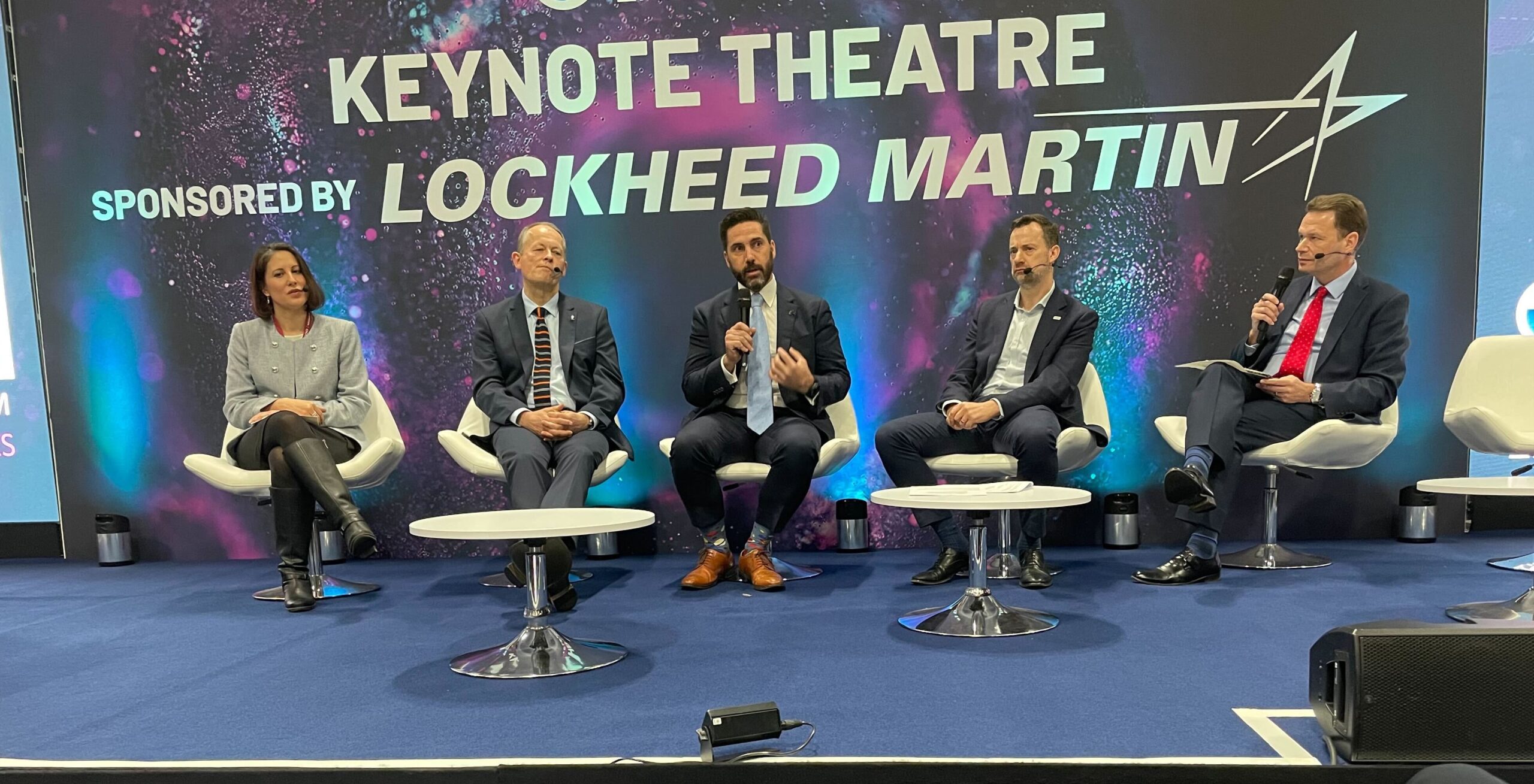UK Space Agency Lead Emphasizes National Priorities at Space-Comm Expo

From left: Tania Celani, Dr. David Parker, Ed Betar, Dr. Paul Bate, and Andy Lison at the UK’s Space-Comm Expo. Photo: Via Satellite
Farnborough, United Kingdom — The United Kingdom is shaping up for one of the most important years in its history in space, with an expected launch this year.
UK Space Agency (UKSA) CEO Dr. Paul Bate spoke on March 6 at Space-Comm Expo in Farnborough, and said that despite the tight fiscal environment, 2024 is likely to be a key year for the nation’s space industry.
“This is the year we expect to see vertical space launch in the U.K. We will become a launch nation. We will be the first in Europe. It supports the goals of our National Space Strategy. In many ways, it completes the value chain. It also helps the process of leveling up in the UK,” Bate said, as launch capability will bring the benefits of space business across the U.K.
Bate spoke of the U.K. having a “reinvigorated” relationship with Europe in space. The U.K. sees itself as a global player in space, to combat security threats.
He said there are “more security threats than ever,” and highlighted that UKSA will open its National Space Operations Centre next month, which combines civil and military space awareness.
“The space sector is a U.K. success story. But, we recognize that we need continued investment in R&D and infrastructure to continue this,” he said.
While acknowledging there will be a general election this year and a possible change in government, Bate believes space will remain a success story regardless of who is in charge of space policy.
He added, “Space will be a government priority whoever the government is. The U.K. space sector has gone from strength to strength. We are sector that employs 50,000 people. It is now almost worth 20 billion pounds [$25.4 billion].”
Bate believes the industry also needs to reach out beyond its bubble. “We can and must reach out to these new audiences. Space is no longer a nice to have, it is a need to have for everybody,” he added.
A Focus on International Collaboration
Following Bate’s keynote, a panel about international cooperation bought together speakers from the Australian Space Agency, the European Space Agency (ESA), UKSA, and the UK government to talk about the importance of collaboration in space.
Tania Celani, deputy director of International, Resilience and Regulation for the Department of Science, Innovation and Technology (DSIT) in the U.K. spoke of the importance of sending the right signals from a government perspective.
“The signal and the intent from the government is so important. International cooperation is at the heart of our strategy towards space. That outward facing collaborative approach is key. We have really good structures in place that enable us to take up a much more joined up approach when thinking internationally. We are acting in a coordinated effort. It increases our influence internationally. It is about collaborating government to government, agency to agency,” she said.
Celani also highlighted recent government talks with France and the U.S. where there was a space component in the dialogue. “As missions get much more complex, we have to figure out how we navigate regulations and policy,” she added.
David Parker, ESA special advisor to the director general, spoke about how international collaboration is in ESA’s DNA. He pointed to the fact three members of ESA are not members of the EU. ESA’s overall goal is to strengthen Europe in space, and cooperation is key to this approach.
“You will find cooperative elements in all our missions, working with NASA, for example. In EO, we have a very strong collaboration with Japan. There is this network of cooperation and links,” Parker said. “If you look at the big powers in space, other countries are becoming strong. There are new players investing in space. For example, South Korea wants to double its space budget by 2027. There are new players to talk to.”
Bate admitted that when looking at nations to collaborate with, that it is not possible to work proactively with every nation, adding, “These relationships make a difference. You have to pick and choose where you invest your time.”